TODAY’S READING FROM THE OLD TESTAMENT- 2 KINGS 20:1-22:2
In 701 BC, Hezekiah became deathly ill. Isaiah, the prophet, visits him to tell him to get his house in order because he is about to die. We don’t know the cause of his illness, but it happened at the time of Sennacherib’s invasion of Jerusalem.
Hezekiah responded to this bad news by turning his face to the wall and asking the Lord to extend his life, weeping bitterly in prayer. You can learn more about Hezekiah’s prayer as Hezekiah reflects upon his memory of it in Isaiah 38:9-20. He reminds the Lord of his earnest devotion to the Lord.
2 Chronicles 32 tells us that Hezekiah’s heart was lifted up with pride (2 Chronicles 32:25).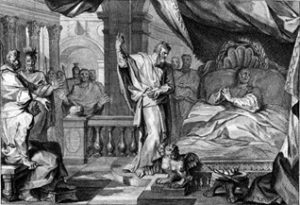
The prophet Isaiah was on his way out in the middle court of the palace when the Lord instructs him to go back and let Hezekiah know that He has heard Hezekiah’s prayers and seen his tears and gives him a three-fold promise.
- He would heal him physically, adding 15 years to his life.
- He would go up to the temple of the Lord on the third day
- He would be delivered from the attempts of the King of Assyria to take the city of Jerusalem.
This the Lord would do, not for Hezekiah’s sake, but for His own sake and for the sake of His promise to David.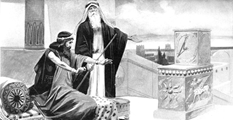
The Lord mercifully brought healing to Hezekiah through ordained means. He instructed that figs be applied to the boil. God uses various prescribed means to bring healing, including medicine, but ultimately, He is the One who provides the healing.
The Lord graciously provided a sign to confirm that He would fulfill His promise by causing the sundial to go back 10 steps. Egyptian sundials were made in the form of miniature staircases arranged in such a way that the movement of the shadows would reflect the time of the day. We are told that the sundial of Ahaz went ten degrees backward. We do not understand how it all worked out, but Hezekiah recognized this as a sign, nothing short of a miracle, and it was done in such a way that the celestial system was held intact.
The Scriptures record that Hezekiah did humble his heart.
2 Chronicles 32:26 26 However, Hezekiah humbled the pride of his heart, both he and the inhabitants of Jerusalem, so that the wrath of the LORD did not come on them in the days of Hezekiah.
However, the 15 extra years added to Hezekiah’s life would bring heartbreak, both to Hezekiah and his country.
If Hezekiah’s son, Manasseh, was 12 years old when he became king (2 Kings 21:1), then he was conceived in the extended years granted to Hezekiah. Manasseh was unsurpassed in wickedness as king. And although God was true to His promise to keep the Assyrians from destroying Jerusalem, Hezekiah would learn that his foolish pride exposed all the treasures of his palace to the Babylonians, who would eventually come and take it away. He is told that some of his descendants would become eunuchs, castrated servants taken captive to Babylon.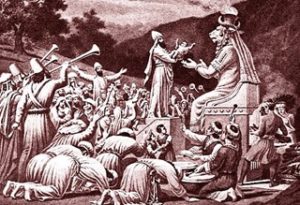
Manasseh’s sins are recorded in 2 Kings 21. He was an enthusiastic promoter of blasphemous idolatry. He sacrificed his own son in the fire as an offering to Chemosh. He put the Asherah pole, as an object of worship, in the temple.
2 Kings 21:16 16 Moreover, Manasseh shed very much innocent blood until he had filled Jerusalem from one end to another; besides his sin with which he made Judah sin, in doing evil in the sight of the LORD.
We also read this about Manasseh’s sin:
2 Kings 21:10-12 10 Now the LORD spoke through His servants the prophets, saying, 11 “Because Manasseh king of Judah has done these abominations, having done wickedly more than all the Amorites did who were before him, and has also made Judah sin with his idols; 12 therefore thus says the LORD, the God of Israel, ‘Behold, I am bringing such calamity on Jerusalem and Judah, that whoever hears of it, both his ears will tingle.
2 Chronicles 33:9 9 Thus Manasseh misled Judah and the inhabitants of Jerusalem to do more evil than the nations whom the LORD destroyed before the sons of Israel.
2 Chronicles 33:10 10 The LORD spoke to Manasseh and his people, but they paid no attention.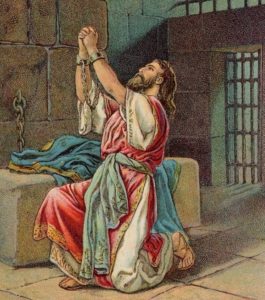
The writer of 2 Kings does not tell us the story of Manasseh’s eventual repentance, but it can be found in 2 Chronicles 33:11-13 and 19.
2 Chronicles 33:13 13 When he prayed to Him (the Lord), He (the Lord) was moved by his entreaty and heard his supplication, and brought him again to Jerusalem to his kingdom. Then Manasseh knew that the LORD was God.
Manasseh is taken away by the Assyrians to Babylon as a prisoner, eventually humbling himself, putting away his pride (2 Chron 33:12). God mercifully brings him back to Jerusalem, where he repents of his idolatry and removes the foreign gods from the temple, attempting to undo the damage that he had done.
This is an example of God’s infinite mercy and forgiveness.
Manasseh reigns for 55 years and is succeeded by his son, Amon, who becomes king at the age of 22 and does that which is evil in the eyes of the Lord, personally succumbing to idolatry and promoting it. He is assassinated by his officials, who in turn are assassinated by the people of the land. Josiah, Amon’s son, is made king at the tender age of 8.
Our reading concludes with this good report of King Josiah.
2 Kings 22:2 2 He did right in the sight of the LORD and walked in all the way of his father David, nor did he turn aside to the right or to the left.
TODAY’S READING FROM THE NEW TESTAMENT – ACTS 21:17-36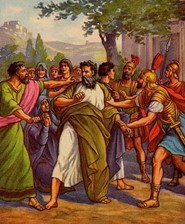
When Paul arrives in Jerusalem, he submits himself to the leadership of the local church. James, the half-brother of Jesus, is the predominant leader, as we saw in Acts 15. James informs Paul of the tensions they are facing in Jerusalem with people maligning the Christian movement as being ANTI- Jewish, rather than the fulfillment of the Jewish promise. James tells Paul that there are four men in the congregation who are making a voluntary vow at the temple.
Paul agrees to join them, not because Christians are obligated to put themselves under Jewish ceremonial law, but because he wants to promote unity, goodwill, and understanding. The prevalent perception that Paul was opposed to Moses needed correction.
Paul’s actions are an example of him being all things to all men that he might win some.
1 Corinthians 9:19-23 19 For though I am free from all men, I have made myself a slave to all, so that I may win more. 20 To the Jews I became as a Jew, so that I might win Jews; to those who are under the Law, as under the Law though not being myself under the Law, so that I might win those who are under the Law; 21 to those who are without law, as without law, though not being without the law of God but under the law of Christ, so that I might win those who are without law. 22 To the weak I became weak, that I might win the weak; I have become all things to all men, so that I may by all means save some. 23 I do all things for the sake of the gospel, so that I may become a fellow partaker of it.
The opponents of the gospel make trouble for Paul by accusing him of disrespect for:
- the Jewish people,
- the Law of Moses
- the Temple.
(Paul will answer these charges in our next readings).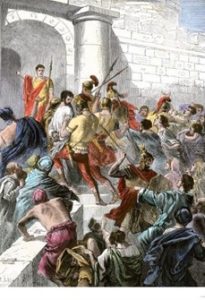
Paul would have been killed then and there by the Jewish crowd if it were not for the fact that a commander of Roman troops showed up, having heard that the whole city was in an uproar. (Remember, it was illegal for the Jews to execute people). The Roman commander bound Paul in chains and asked the crowd what Paul had done wrong. Their response was like that of the crowd that demanded the crucifixion of Jesus. “Away with him!” they cried (Acts 21:36, John 19:15).
TODAY’S READING FROM THE BOOK OF PSALMS- PSALM 150:1-6
Here is the climax of the Book of Psalms- symphonic praise!
Today you have completed your journey through the Bible’s prayer and praise book, the Book of Psalms.
There are so many things to praise the Lord for. And there are many ways we can express our praise. Praise him with your voice, with the expressive dances of joy, with the entire orchestra, not forgetting the brass, woodwinds, strings, and percussion!
LET EVERYTHING THAT HAS BREATH PRAISE THE LORD! PRAISE YE THE LORD!
TODAY’S READING FROM THE BOOK OF PROVERBS- PROVERBS 18:9-10
Proverbs 18:9-10 9 He also who is slack in his work Is brother to him who destroys. 10 The name of the LORD is a strong tower; The righteous runs into it and is safe.
PRAY FOR THE NATIONS- PRAYING FOR INDIA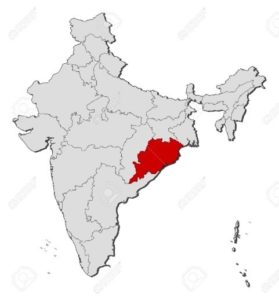
Pray for the INDIAN STATE of ORISSA
Persecution of Christians remains more intense in Orissa than anywhere else in India. Hindu extremist violence is equaled only in Gujarat. After a prominent Hindu swami was murdered in 2008 (most likely by Maoist guerillas), Hindus responded by venting their wrath against Christians- a soft target. Over 120 Christians were murdered, hundreds of churches destroyed, and around 52,000 Christians displaced from their homes. Harsh anti-conversion regulations have done little to placate Hindu extremists. In many districts, some threat remains for Christians to either reconvert to Hinduism, leave their village, or face death. Pray that the right to freedom of belief as laid out in the Constitution might prevail in Orissa and that no amount of intimidation or violence would overcome it. The persecution has no perceptible end in sight; pray that the churches might grow in unity and in their ability to withstand persecution. Pray for peace and harmony where possible, and pray for suffering believers and communities to wisely use the law and available legal aid to protect themselves from unduly harsh treatment.
PRAYER: Lord, You are worthy of extravagant, full orchestral praise! May every member of Your church, as uniquely designed instruments of worship, offer you the fullest praise, with joyous abandon, letting out all the stops with their sounds of thanksgiving! Father, we are grateful that we have a worthy King who sits on the Throne. We put our trust in You afresh, knowing that You know what is best for us and for generations to come. Like the Apostle Paul, may we be willing to pay the needed price of bearing the testimony of Christ wherever we go. We ask it in Jesus’ Name. Amen
